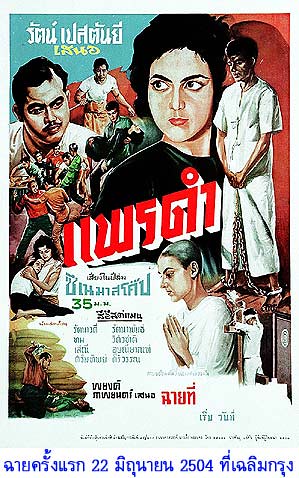
The 15th Thai Short Film & Video Festival wrapped up on Sunday night with the awards ceremony.
Among the big winners was the animated short, Ramakien Animation: Episode 1 (รามเกียรติ์แอนิเมชั่น ตอนธรรมะแห่งราชา), which won the top prize for animation, the Payute Ngaokrachang Medal, named for the pioneering Thai animator, as well as the popular vote award.
Lavishly brought to life by a team of 50 animators led by director Atitat Kamonpet, Ramakien – the Thai version of India's Ramayana epic – was made by photographing murals depicting the story at Wat Phra Kaew and then digitally separating the characters from the backgrounds and giving them movement.
The results are spectacularly mesmerizing.
The Nation had a story about the project last year. There's also a trailer.
The winner of the festival's top prize for general Thai filmmakers – the R.D. Pestonji Award, named after the pioneering Thai filmmaker – was Taiki Sakpisit for A Ripe Volcano (ภูเขาไฟพิโรธ), which screened earlier this year in Bangkok as a two-channel video-and-sound installation. Taiki edited the two channels into one frame, making for a powerful statement on authoritarianism and military might in Thai society.
A runner-up in the R.D. Pestonji competition was Kong Pahurak, for his black comedy Shinda Gaijin, in which a young Japanese woman has to deal with the corpse of a white man repeatedly turning up in her bathtub.
Eakalak Maleetipawan won for A Moment in the Rainforest, which played on similar themes as Apichatpong Weerasethakul's Tropical Malady, with a mystical story about a young woman, a tiger ghost and a monk in the forest.
And Pramote Sangsorn, fresh off his Cannes Cinefondation residency this year, won runner-up for The Island of Utopias, a bleak post-apocalyptic drama that had an old man searching for something in the rubble of a demolished building.
Special mentions went to the three-part Erotic Fragment No. 1, 2, 3 by Anucha Boonyawantana; Distinction by Tulapop Saenjaroen and Mrs. Nuan Who Can Recall Her Past Lives by Chulayarnnon Siriphol. Recalling the title of Apichatpong's 2010 Cannes-award-winning feature, Mrs. Nuan is about two men burying a dead dog.
Tulapop's Distinction had a maid and her employer talking about their lives. Giving their monologues in front of a white background, the two women swap roles back and forth, so after awhile their identities become blurred. Distinction also was among the winners of the Vichitmatra Award for distinctive achievement in filmmaking.

Here's the complete list of winners:
R.D. Pestonji Award (Thai filmmakers)
- Winner: A Ripe Volcano by Taiki Sakpisit
- Runners-up:
- Shinda Gaijin by Kong Pahurak
- A Moment in a Rain Forest by Eakalak Maleetipawan
- The Island of Utopias by Pramote Sangsorn
- Special Mentions
- Erotic Fragment No. 1, 2, 3 by Anucha Boonyawatana
- Distinction by Tulapop Saenjaroen
- Mrs. Nuan Who Can Recall Her Past Lives by Chulayarnnon Siriphol
R.D. Pestonji Award (international competition)
- Winner: Silent River by Anca Miruna Lazarescu (Germany-Romania)
- Special Mentions
- Open Doors by Ashish Pandey (India)
- Machine Man by Alfonso Moral and Roser Corella (Spain)
White Elephant Award (for Thai university filmmakers)
- Winner: Kari Yuka by Eakapon Settasuk
- Runners-up
- Imperial Earths by Phatthi Buntuwanit
- Toilet by Koranan Chuenpichai
- Special Mentions
- Unlikeness by Pitchnut Suktorn
- N.B. by Nattaphan Boonlert
- Swimming Pool by Puangsoi Aksornsawang
Special White Elephant (for filmmakers under 18 years)
- Winner: Change by Boonjira Phungmee
- Runners-up
- House by Setthasiri Chanjaradpong
- Pedigree by Rajchapruk Tiyajamon
- Special Mentions
- Lesbian Fantasy by Teerath Wangwisarn
- The Horse-Faced Lady by Narongchai Naksrichan
Payut Ngaokrachang Medal (for Thai animation)
- Winner: Ramakien Animation: Episode 1 by Atipat Kamonpet
- Runners-up
- Stop Here by Twatpong Tangsajjapoj
- Pupa by Kraisit Bhokasawat
- Special Mentions
- Be with You Japan by Cholawit Xuto
- Over the Rainbow by Phattharamon Urahvanicha
- Makprao by Sarida Pao-aroon
- Together by Nalat Choravirakul
Duke Award (for Thai documentaries)
- Winner: 95110 Postal Dream by Taweewit Kijtanasoonthorn
- Runners-up
- Our Home Huai Hin Dam by Pisut Srimhok
- A Brief History of Memory by Chulayarnnon Siriphol
Kodak Film School Competition (for cinematography)
- Unlikeness by Pitchnut Suktorn
Vichitmatra Award (for distinctive achievement in filmmaking according to jury’s judgement)
- Night Blind by Chonlasit Upanigkit and Rasika Prasongtham
- Just Came Back from the Magic Kingdom Far Far Away by Pass Patthanakumjon
- Distinction by Tulapop Saenjaroen
- Swimming Pool by Puangsoi Aksornsawang
Pirabkao Award (for the film that expresses freedom and equality issue and urges the social concern)
- Three Generations; What do they think? by Panu Saeng-xuto and Kwankaew Ketphol
Best Acting
- Cholpassorn Khahakantara from Just Came Back From the Magic Kingdom Far Far Away
Popular Vote
- Ramakien Animation: Episode 1 by Atipat Kamonpet
The list of winners in Thai is at the Thai Film Foundation website.

(Thanks Sanchai!)






































